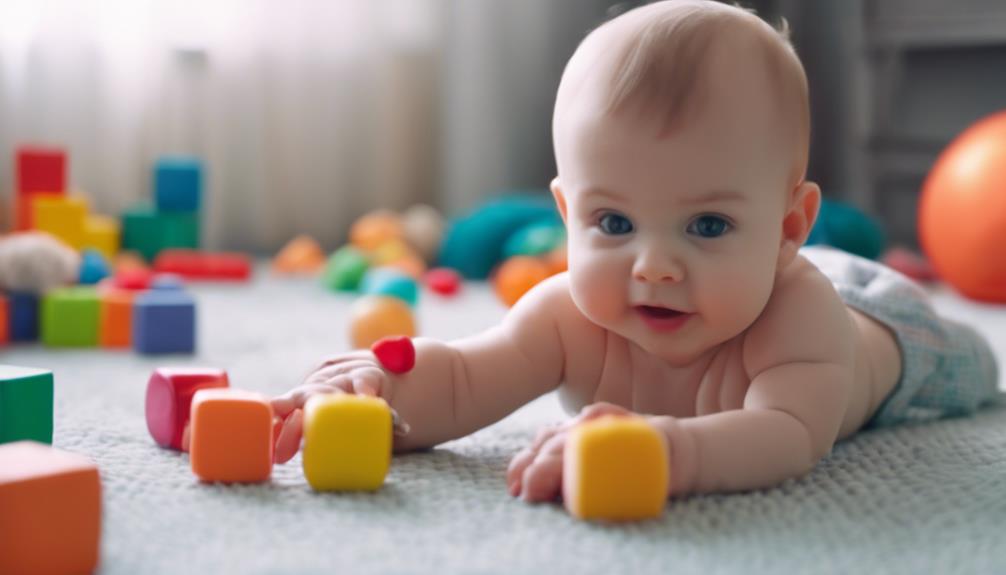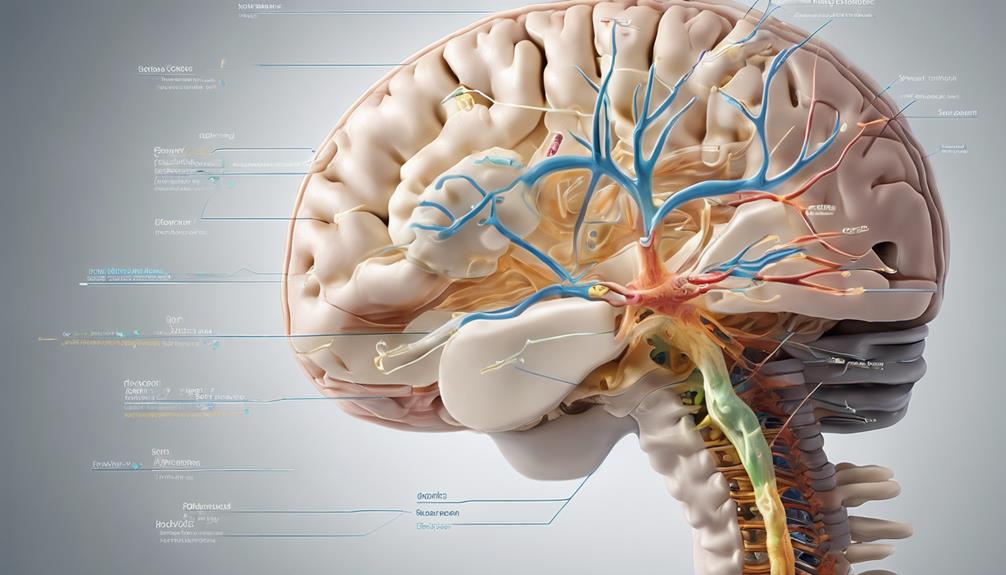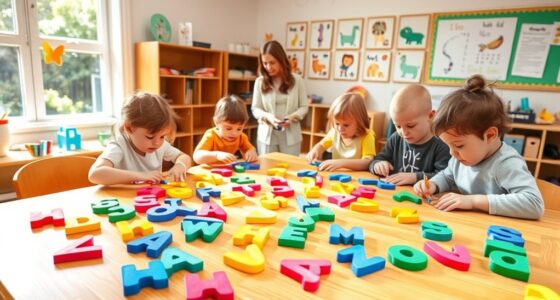Engage your baby in Tummy Time activities to help with muscle development, prevent flat head syndrome, and enhance motor skills. Fun With Faces games can assist in communication learning and foster important social skills. Try out Sensory Exploration Ideas to stimulate your baby’s senses and improve focus. Social Interaction Playtime can help build strong bonds and teach cooperation. Introduce Cognitive Development activities like Find It Games to promote problem-solving skills and critical thinking. Enhance bonding with Musical Interaction by singing lullabies and listening to soothing melodies. Playful Storytelling with colorful picture books encourages participation. Explore these activities to further support your baby’s holistic development.
Key Takeaways
- Tummy time activities promote muscle and motor skills development, preventing flat head syndrome.
- Find It games enhance problem-solving skills and critical thinking in babies.
- Fun with faces games aid in communication learning, sensory development, and language skills.
- Sensory exploration ideas stimulate senses, improve cognitive development, and enhance hand-eye coordination.
- Musical interaction bonding through lullabies and games fosters language acquisition and listening skills in babies.
Tummy Time Activities
Engage your baby in tummy time activities to promote essential muscle development and prevent flat head syndrome. Tummy time plays an important role in strengthening your baby's neck and upper-body muscles. By starting tummy time from the first day home, you lay a strong foundation for your baby's overall motor skills development. As your baby grows stronger, gradually increase the duration of tummy time sessions to further enhance these muscles.
During tummy time, encourage reaching and crawling movements to aid in the development of fine and gross motor skills.
Developmental activities during tummy time are essential for your baby's growth and physical capabilities. These activities not only prevent flat head syndrome by encouraging different positions but also stimulate the brain and foster a sense of exploration. Through consistent engagement in tummy time exercises, you provide your baby with the opportunity to develop key motor skills essential for their overall development.
Fun With Faces Games

As you engage in Fun With Faces games with your baby, activities like Peek-a-boo Fun and Mirror Exploration can be incredibly important.
By encouraging your baby to touch and name facial parts, you're aiding in their communication learning.
Guiding their hands to their face during these games can help them understand facial expressions better, fostering vital communication development.
Peek-a-boo Fun
Peek-a-boo Fun, a delightful activity involving hiding and revealing faces, is a classic game that aids in babies' understanding of object permanence. By engaging in this playful interaction, infants grasp the concept that objects continue to exist even when they're out of sight.
Through peek-a-boo, babies not only enhance their cognitive development but also strengthen the bond with their caregivers. The surprise element in this game helps babies learn about anticipation and develop essential social skills.
Additionally, making funny faces during peek-a-boo not only adds a touch of humor but also fosters communication learning for babies. This timeless game not only brings joy to both the caregiver and the baby but also serves as a valuable tool in the early stages of a child's development, laying the foundation for important cognitive and social abilities.
Mirror Exploration
Mirror exploration during playtime provides a valuable opportunity for babies to learn about facial expressions and communication. By engaging in fun with faces games, infants can enhance their sensory development by touching and observing their own reflections.
Encouraging babies to explore their facial features in the mirror while naming different parts like eyes, nose, and mouth can also aid in language skills development. Making various facial expressions in front of the mirror not only teaches babies about emotions but also helps them understand social cues.
Through interactive mirror play, infants can start recognizing familiar faces and different expressions, promoting their facial recognition skills. These activities offer a multi-sensory experience that stimulates cognitive development and encourages babies to interact with their environment.
Mirror exploration is a simple yet effective way to foster early learning and lay the foundation for future social and emotional understanding.
Sensory Exploration Ideas

Engage your baby in sensory exploration activities to stimulate their senses and promote cognitive development. Sensory play is crucial for helping infants explore the world around them and understand different textures.
To enhance hand-eye coordination, provide your little one with various objects of different shapes and sizes to touch and feel. Consider creating sensory bins filled with items like rice, beans, or soft fabrics for your baby to explore.
Introduce them to new scents by using scented toys or safe items like vanilla extract on a cloth. Encourage listening skills by incorporating different sounds such as rattles, musical toys, or nature sounds during playtime.
These activities not only enhance brain development but also help your baby regulate emotions and improve focus and attention span. Sensory exploration is an essential aspect of your baby's growth, allowing them to make sense of the world one touch, smell, and sound at a time.
Social Interaction Playtime

Encouraging social interaction playtime with your baby is vital for fostering communication skills and building strong bonds.
Engaging in play with caregivers or other babies not only provides fun but also promotes social bonding.
Turn-taking during play is a crucial aspect as it teaches babies about social interactions and helps them develop patience.
Interactive play sessions play a significant role in promoting emotional development and empathy in babies.
Additionally, playing with others encourages babies to learn about cooperation and sharing.
Cognitive Development Activities
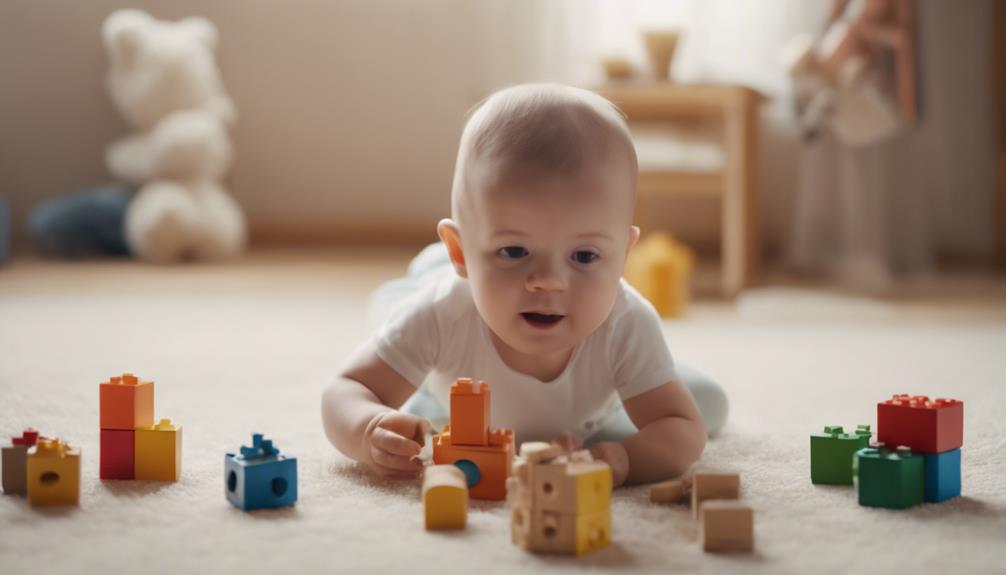
To enhance your baby's cognitive development, participate in find it games that promote problem-solving skills. These interactive play activities help babies learn to problem-solve and think critically. Additionally, demonstrating object relationships using blocks can further enhance cognitive development by teaching infants about spatial awareness and the concept of cause and effect. Through interactive play activities, babies can begin to understand how their actions lead to specific outcomes, fostering early cognitive skills. Encouraging sensory awareness by wrapping objects for babies to explore can also aid in cognitive development, as it allows them to engage multiple senses simultaneously, promoting neural connections. Connecting sensory information to everyday experiences further strengthens cognitive abilities by helping babies make sense of the world around them. Engaging in these activities can provide a strong foundation for your baby's cognitive development, setting them up for success in their future learning endeavors.
| Find It Games | Object Relationships | Cause and Effect |
|---|---|---|
| Promote problem-solving skills | Enhance spatial awareness | Foster understanding of actions and outcomes |
| Encourage critical thinking | Teach about object connections | Develop early cognitive skills |
| Stimulate brain activity | Improve problem-solving abilities | Enhance logical reasoning |
Creative Bonding Activities
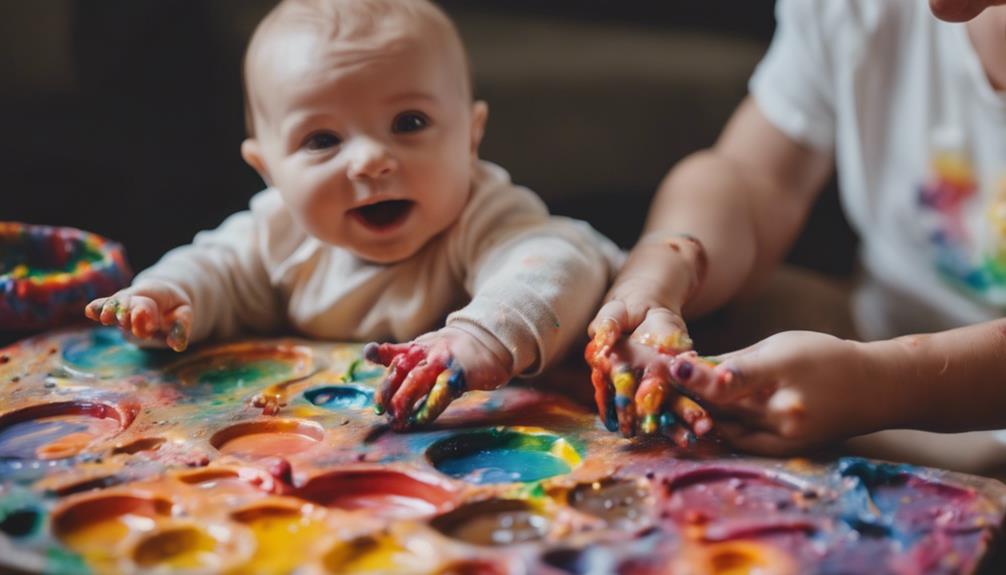
Try incorporating artistic sensory exploration activities like finger painting or playing with colorful sensory bins to enhance your bonding experiences with your little one.
Musical interaction bonding can be achieved through activities like singing lullabies, dancing together to rhythmic tunes, or introducing your baby to different musical instruments for a sensory-rich experience.
Engage in playful storytelling moments by using books with interactive features, incorporating puppets, or even creating your own stories to captivate your baby's imagination and strengthen your parent-child bond.
Artistic Sensory Exploration
Engage in artistic sensory exploration activities with your baby to strengthen your bond and promote creativity.
Here are some activities you can try:
- Finger Painting: Let your baby explore different colors and textures by using their hands to create unique artwork.
- Sensory Bins: Fill bins with materials like rice, pasta, or sand for your baby to touch and play with, enhancing their sensory experience.
- Texture Collages: Collect various textured materials like fabric scraps, cotton balls, or feathers for your baby to glue onto paper, stimulating their sense of touch.
- Nature Art: Take a nature walk with your baby to collect leaves, flowers, and sticks to create beautiful pieces of art together.
- Watercolor Play: Introduce your baby to the magic of watercolors by letting them experiment with blending colors and creating patterns on paper.
These activities not only provide sensory stimulation but also foster creativity and strengthen the bond between you and your baby through shared experiences of play and exploration.
Musical Interaction Bonding
Enhance your bond with your baby through musical interaction bonding activities that foster emotional connection and cognitive development. Engaging in musical activities not only strengthens parent-child relationships but also provides sensory stimulation crucial for your baby's growth. By singing lullabies, playing musical games, or simply listening to calming melodies together, you create a soothing environment that promotes bonding and emotional well-being. These interactions also aid in the development of your baby's listening skills, rhythm recognition, and language acquisition. Incorporating music into playtime encourages creativity, self-expression, and positive social interactions, all while fostering a deeper connection between you and your little one.
| Musical Interaction Activities | Description | Benefits |
|---|---|---|
| Singing Lullabies | Singing soft melodies to your baby before bedtime | Enhances emotional bonding and promotes relaxation |
| Playing Musical Games | Engaging in fun musical activities like peek-a-boo with songs | Stimulates cognitive development and encourages playfulness |
| Listening to Soothing Melodies | Playing calming music in the background during playtime | Provides sensory stimulation and creates a peaceful atmosphere |
Playful Storytelling Moments
Storytelling with your baby during playtime can create joyful and imaginative bonding experiences. Incorporating interactive storytelling activities can't only strengthen your connection with your little one but also aid in their overall development.
Here are some ideas to make your storytelling moments with your baby even more engaging:
- Use baby toys to enhance the storytelling experience and make it more interactive.
- Read colorful picture books together to stimulate your baby's brain development and captivate their attention.
Establish a routine for bedtime stories to help your baby relax and develop healthy sleep habits. Engage in interactive storytelling by using different voices and facial expressions to make the stories come to life.
Encourage your baby to participate in storytelling by asking simple questions or allowing them to make choices within the story.
Frequently Asked Questions
What Activity Is Key to All Areas of an Infant's Development?
Tummy time is key to all areas of your baby's development. It helps with motor skills, cognitive abilities, and social-emotional growth. Start early, increase as baby grows stronger. Create a safe, stimulating space for this essential activity.
How Do You Play With a Baby for Development?
Do you know how to play with a baby for development? Engage in activities like tummy time, sensory play, reaching and crawling, interactive games, and reading. These interactions are vital for enhancing various skills in infants.
What Is One Activity You Plan on Doing to Help Your Baby's Development?
You plan to engage in tummy time with your baby, helping develop their neck and upper-body muscles. It's a fun and beneficial activity for your little one's growth and development. Enjoy this bonding time!
What Activities Are Good for Infants?
For infants, activities like tummy time, engaging with faces, playing with simple materials, splashing in water, and reading help in muscle development, communication skills, motor skills, sensory experiences, and brain stimulation.
Conclusion
To sum up, engaging in developmentally appropriate activities with your baby can have a positive impact on their overall growth and learning. By incorporating tummy time, sensory exploration, social interaction, cognitive development, and creative bonding activities into your playtime routine, you can help support your baby's physical, cognitive, emotional, and social development.
Remember to follow your baby's cues and interests, and have fun exploring and learning together!

